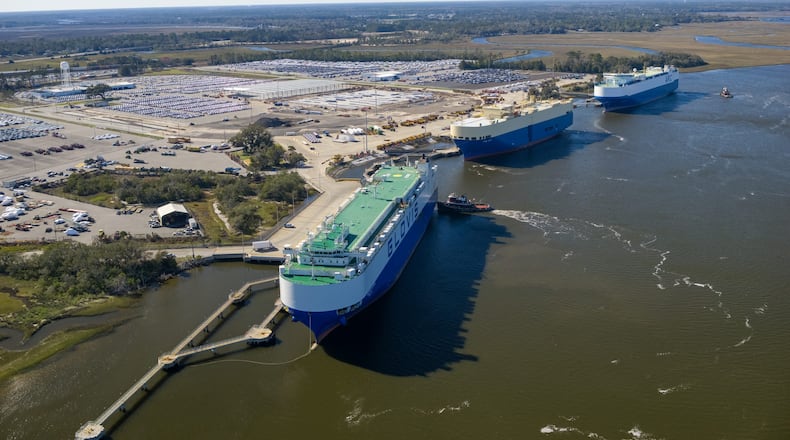JEKYLL ISLAND — The Port of Brunswick’s ascent as one of the United States’ leading hubs for automobile imports and exports over the last decade has threatened to outpace the facility’s capacity.
Not anymore.
During the annual Brunswick State of the Ports luncheon on Monday, Georgia Ports Authority CEO Griff Lynch highlighted expansion projects that will allow Brunswick to surpass the Port of Baltimore as the nation’s top port for roll-on, roll-off cargo as early as 2026. The improvements include the addition of a fourth ship berth at Brunswick’s main terminal at Colonel’s Island and a widening and deepening of the Brunswick harbor.
“We will be the No. 1 port when we stand before you at this event in 2026,” Lynch told members of the Brunswick Golden Isles Chamber of Commerce at the Jekyll Island Convention Center. “That’s not meant as a way for us to bang on our chests, it’s to stimulate our economy and the state’s economy.”
The Port of Brunswick and other ports authority facilities support 561,000 jobs and contribute $59 billion annually to the state’s gross domestic product, a study by the University of Georgia showed.
Brunswick is one of two coastal seaports in the Georgia Ports Authority. Brunswick handles automobiles, heavy equipment and other wheeled vehicles along with breakbulk cargo, or goods too large to fit into shipping containers. The Port of Savannah is GPA’s container port and ranks as the third-busiest in the country.
Even with Monday’s focus on Brunswick, the Port of Savannah was top of mind. Gov. Brian Kemp issued letters Monday afternoon addressed to each member of Georgia’s congressional delegation expressing support for a Savannah River deepening study.
Georgia Ports officials have asked Congress to authorize the U.S. Army Corps of Engineers to explore a widening and deepening of the Savannah shipping channel as part of the 2024 Water Resources Development Act.
Credit: Special
Credit: Special
“GPA is vital to our national supply chain and as a job creator for our state. It is critical we work together to ensure GPA can continue to accommodate ever-larger container vessels calling on our ports,” Kemp wrote.
The federal government is investing in the Brunswick harbor. Congressman Buddy Carter, R-Pooler, told attendees at Monday’s luncheon the U.S. House has included nearly $20 million for Brunswick in an appropriations bill passed in recent days.
According to Lynch, the Brunswick channel has not been at the proper depth or width “for years now.” The federal dollars pledged should allow the harbor modification project to begin in fall 2024 and be completed in 2026.
The improvements should coincide with Brunswick passing Baltimore as the nation’s busiest roll-on, roll-off port. Brunswick cargo growth rate has nearly tripled Baltimore’s since 2012, including an 18% increase in the fiscal year that ended June 30. Brunswick handled a record 723,500 vehicles.
Credit: SPECIAL
Credit: SPECIAL
Expansion projects now underway will boost the Georgia terminal’s capacity to 1.4 million vehicles. the planned fourth ship berth is in the engineering stage and is designed to accommodate the largest roll-on, roll-off ships, those that transport 7,000 vehicles at a time. Once completed, the berth equates to two more vessel calls each week, Lynch said.
The expansion is meant to handle continued traffic growth as well as roll-on, roll-off ships that previously called on Ocean Terminal at the Port of Savannah. That facility is being converted into a container terminal, and 19,000 cars processed annually through Ocean Terminal will be rerouted to Brunswick.
By the end of the year, all auto freight through the Georgia Ports Authority will pass through Brunswick.
“By concentrating on containers in Savannah and autos and machinery in Brunswick, we are able to streamline our operations and provide more efficient service to both of our main business sectors as cargo volumes continue to grow,” Lynch said.
Brunswick is utilized by 23 carmakers, with the bulk of the business coming from Hyundai, Kia, Mercedes, Nissan and Subaru. Three-quarters of the cars handled are imports, although two auto assembly plants currently under construction in the state will feed into Brunswick’s export business.
The Hyundai Metaplant near Savannah is to begin production in late 2024 or early 2025 while a Rivian factory near Social Circle is expected to open in 2026.
Georgia Ports officials could not forecast the increase in business related to those facilities, citing guidance from the automakers that much of the autos produced in Georgia will be for domestic sale.
Brunswick is due to receive an influx of vehicle imports from two ports on Mexico’s east coast: Altamira and Veracruz. Nissan and Kia operate manufacturing facilities near Altamira while Volkswagen makes cars near Veracruz. Ocean carrier and ports customer CMA-CGM established a service route in July, and another freight titan, Gold Star, will begin transporting autos to Brunswick in November.
This Mexico-to-the-U.S. “nearshoring” trend, combined with an increase in the supply of roll-on, roll-off ships, should push Brunswick’s automobile throughput to 1 million vehicles a year by 2030, Lynch said.
About the Author
Keep Reading
The Latest
Featured






